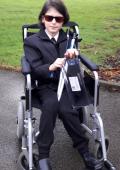Oliver, age 13, lives in North Yorkshire. Having previously been unable to attend school, we were delighted to receive the following update from him and his mum Catherine in May 2019.
Oliver told us: "A consistent Teaching Assistant (TA) that understands has enabled me to attend school. Initially I went for just 20 minutes once a week and very, very gradually increased this. I can now do almost a full lesson, P3 as this is the best time of day for me and gives me time to get ready to go and rest after before my brother comes home.
"I use a wheelchair for school and avoid the busy, noisy times when classes are changing, going in before the class starts and leaving before it finishes. My TA stays with me; she helps with my co-ordination difficulties and reads/copies from board for me. I am allowed to wear jog pants and a T-shirt; they are more comfortable and easier to manage as I can't fasten buttons very well. My home tuition had been just two days a week for 10 to 20 minutes. I can now do nearly an hour on Monday and Thursday, which is brilliant, though after my visit to school on Tuesday I find I can't concentrate or co-ordinate to do as much on Wednesday."
When Oliver spoke to us in June 2018, he was still too unwell to attend school at all.
Oliver says: “My life used to be very busy. I was the captain of the local football team, I did swimming and cross-country, and was a keen fell runner, which we travelled all over for to races and events. And I loved school. My favourite subject was PE – now it’s mathematics. I’ve had to stop going to school completely, because I haven’t got the energy I used to, and I can’t travel at all, not like before. The only exercise I can do now is sometimes play catch with my brother.
“I’ve taken up some new skills instead. When I first became ill, I had more energy than I do now, and I wanted to do something positive. So I make greetings card, which started off just for friends and family, but now I sell them at a few table tops a year, and I take them to church when I’m well enough to go. I sell some for charity too, and I really enjoy making the special ones my friends ask for especially.
“The hardest thing about having M.E. is not always being able to join in. I can’t go to school, but I at least get some home tutoring, and see my friends at home. Some have been quite shocked when they saw me in a wheelchair, especially my football team mates.
“Mornings are hard, because my brain is telling me to get up, eat a huge breakfast, and go off to school. But when I try to do that, my body tells me I can’t. Everything takes a long time. Before I was ill I was always thinking about food! But now it’s hard to swallow sometimes, and I don’t eat very much. I wish other people understood that, just because they’ve seen me looking alright today, doesn’t mean I will be OK tomorrow.”
Oliver’s mum Catherine says: “Oliver recently had a 15-minute school visit which, for us, was a two and a half hour round trip: getting ready, resting before getting in the car, travelling to school, resting before getting out of the car. His teachers were excited to see him and talk to him, which was overwhelming and too much for Oliver to manage, as noise and lots of conversation is difficult for him.
“Having support from Action for M.E. means a lot. Oliver got a card from the Children and Young People’s Services team on his birthday, and it made a big difference to receive something from people who understand how it feels to have M.E.”



